The perpetrators of the 2008 Mumbai attack, who shot dead 166 people, had confessed to details that should have been enough to hang him, but Pakistan enjoyed his anti-India rhetoric and let him spread his tentacles.
A revealing excerpt from Khaled Ahmed's Pakistan's Terror Conundrum.
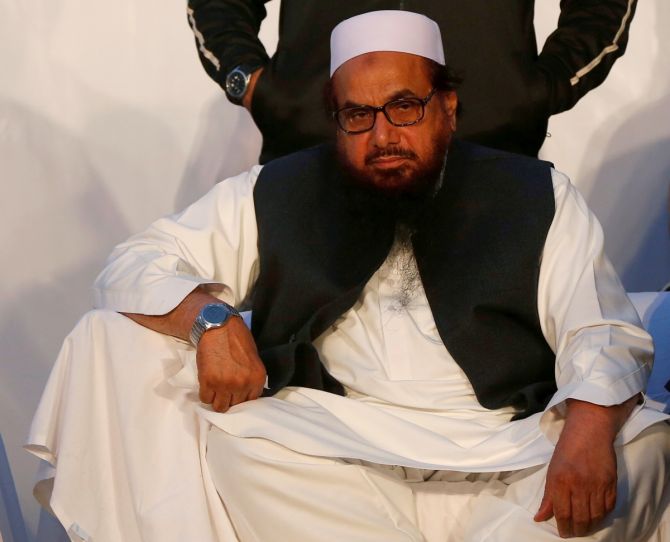
When an 'under pressure' Pakistan initiated '23 cases against Hafiz Saeed and his 12 aides over terrorism-financing', the news was immediately flashed in all the major Indian and Pakistani newspapers. Daily Times in Pakistan carried the story on 4 July 2019:
The counter-terrorism department (CTD) said it had launched 23 cases against Hafiz Saeed and 12 of his aides for using five trusts to collect funds and donations for Lashkar-e-Taiba (LeT).
Two banned LeT-linked charities, Jamaat-ud-Dawa (JuD) and Falah-e-Insaniat Foundation (FIF), were also targeted, the department said in a statement.
"All the assets of these organizations and individuals will be frozen and taken over by the state," said a counter-terrorism senior official, speaking on the condition of anonymity because he was not authorised to speak publicly.
The CTD was quoted as saying that "the action is in accordance with UN sanctions against the individuals and entities".
No mention was made of the courts Saeed had been running across the country. The News (on 9 April 2016) had earlier disclosed that Saeed had been doing something unforgivable, that is, running stealth courts in violation of the constitution of Pakistan:
The supra-constitutional Sharia courts, established by Jamaat ud Dawa, operate across the country and only the Lahore court of this parallel judicial system has issued verdicts in 5,550 cases, including murder trials.
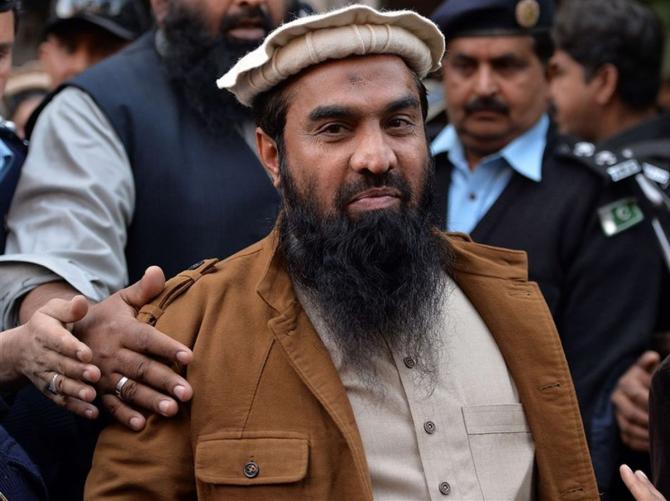
The pressure in 2019 to 'do something' had come from the Paris-based FATF, which placed Pakistan on its 'grey list' of countries with inadequate controls over money laundering and terrorism financing.
The US had offered $10 million for Saeed's head in 2012; Pakistan finally offered it on a platter and, as quid pro quo, got the US to declare the Balochistan Liberation Army a terrorist organisation.
The BLA had long been seen as India's tit-for-tat response to the Pakistani 'non-state actors' launching attacks in India.
Geo TV anchor Kamran Khan, in his 12 November 2012 programme, had revealed that Pakistani officials had told the anti-terrorism court judge Chaudhry Habibur Rehman, on 10 November 2012, that 'the terrorists who attacked and killed over 166 innocent people in Mumbai on 26 November 2012, belonged to the LeT and that they had trained at various cities of Pakistan.The mastermind of this attack, Zaki-ur Rehman Lakhvi, was under trial at Adiala jail in Rawalpindi.'
However, on the order of the Lahore high court, Lakhvi was finally released on bail on 10 April 2015.
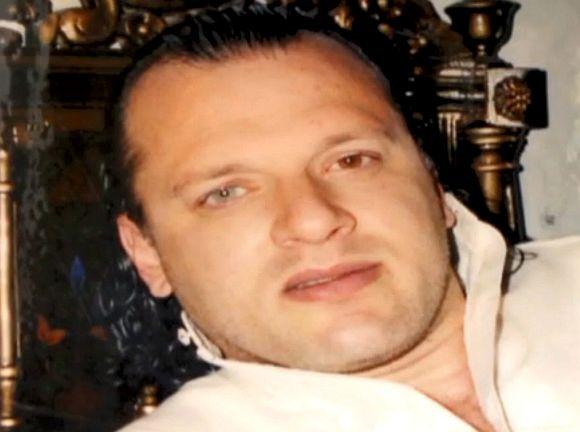
And just as one thought that the Mumbai massacre planner, Pakistani-American David Headley/Daood Gilani, had disappeared from the world terror radar to spend 35 years in an American prison, more information about him surfaced in a documentary by PBS-Frontline.
The new lowdown came from a typed 'memoir' apparently put together by him. He wrote that he joined the LeT before the 9/11 attacks in the US, and ended up reconnoitring for the November 2008 Mumbai attack, which killed 166.
It turns out that without him laying out the 'mission map', the attack wouldn't have taken place.
Headley went to Pakistan in July 2002 and visited the Qadisiya mosque, then the headquarters of LeT in Lahore, meeting Saeed, to reveal his interest in covert jihad.
This was not the first time Pakistan had moved to arrest Saeed. In February 2017, he had been confined to his house, but support for him had swelled around the country.
His followers staged protests against his confinement. No one dared point to evidence, which was internationally in circulation, about his involvement in acts of terrorism in India and India-administered Kashmir.
A statement made by the then defence minister Khawaja Muhammad Asif, however, opened the floodgates of castigation on the Nawaz Sharif government.
Reports said that Khawaja Asif was in Germany when he committed the 'blasphemy&' of saying: 'Hafiz Saeed can become a threat to society.'
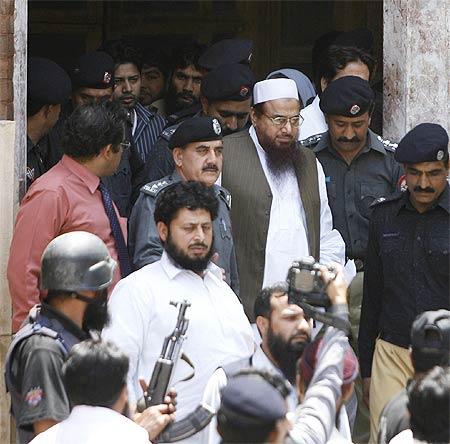
The world and the UN accused Saeed of committing atrocities in India and Afghanistan. The latter had him on its 'reward list' of terrorists, but in Pakistan he was the wealthiest philanthropist alive.
However, two terrorists, Daood Gilani and Ajmal Kasab confessed to details of his involvement in international terrorism. But Pakistan's devotion to him ran deep.
His reported running of private courts in Pakistan seemed to have been forgiven.
After Khawaja Asif's statement in Germany, Pakistan experienced a pro-Saeed earthquake. The dreaded Defence of Pakistan Council (DPC), which scared anyone critical of the policies of jihad, fired a broadside at the government Asif served.
A roll call of those who would have liked Sharif's term in office to end prematurely joined in. Their beef was that instead of 'speculating' whether Saeed could become a threat or not, Khawaja Asif should have highlighted the atrocities committed against Muslims in Kashmir.
Former Azad Kashmir prime minister Sardar Muhammad Atique said that Khawaja Asif was appeasing India; and PTI leader Mahmood Ur Rasheed thought the Sharif government had become 'defensive' on India and the US, making Khawaja Asif sound more like the defence minister of India than of Pakistan.
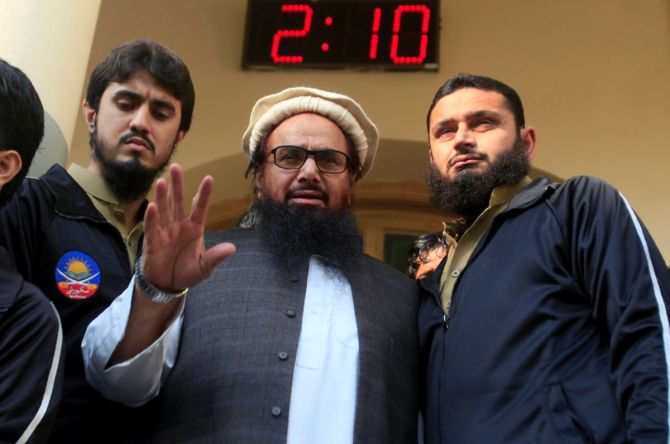
In September 2017, it had become certain that unless the powers-that-be intervened, the dubious empire of under house-arrest and internationally dubbed terrorist Saeed had come to an end, and that the process of 'mainstreaming' recommended by retired generals debating on talk shows had been shipwrecked.
The foreign office, under Foreign Minister Khwaja Muhammad Asif, had finally decided that Saeed's Milli Muslim League should not have taken part in the by-polls of the NA-120 constituency, bagging 5,822 votes and beating the mainstream PPP.
In the same month, the foreign office followed up on the letter of the interior ministry under Minister Ahsan Iqbal, in answer to a query sent by the Election Commission of Pakistan about whether the MML should be allowed to take part in the by-polls.
The interior ministry stated:
'There is evidence to substantiate that [the] Lashkar-e-Taiba (LeT), the Jamaat-ud-Dawa [JuD] and Falah-e-Insaniat Foundation (FIF) are affiliates and ideologically of the same hue, and [therefore] the registration of the MML is not supported.'
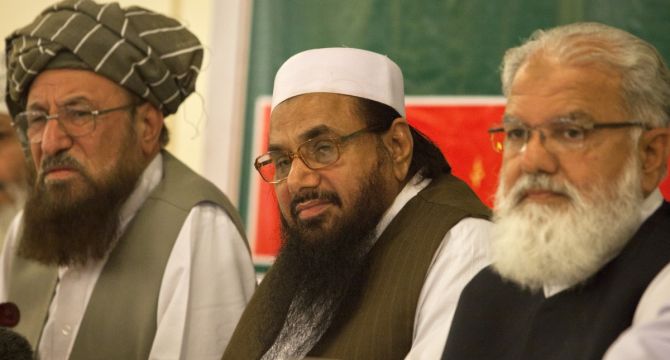
In 2008, the UN Security Council had added JuD to the banned list under Resolution 1267, as a 'supporting agent of the banned Lashkar-e-Taiba'.
Saeed and his various 'charity' organizations, including hundreds of schools and colleges, were a prime example of the 'mainstreaming' of an outlawed organisation by Pakistan.
Its negative fallout was also endured, like the running of private courts under 'Islamic law' by the banned outfit.
The state helped further by enlisting Saeed's enormous wealth for the 'renewal' of regions depredated by state neglect and local rebels in Sindh and Balochistan.
What had been highlighted by a lame-duck PML(N) government was the negative consequence of what was called 'mainstreaming' by some elements of the State.
Instead of deradicalising the declared terrorists, the process sought to further radicalise society and undermine the power of the State as per the constitution.
Also, the 'indirect' and 'implied' Chinese warning at a BRICS summit earlier that year had to be heeded.
In March 2005, Saeed routinely issued criticism of the government's policies. After having abandoned the grand Muridke seminary, which he ran under the cover of Markaz Dawat wal-Irshad, he was now firmly established near Chauburji in Lahore, not lacking in financial and manpower muscle.
Urdu newspapers felt obliged to print his almost-daily diatribes against 'the misdirection of the country'.
He was part of the trio (the other two being Masood Azhar of JeM and Fazlur Rehman Khaleel of Harkatul Mujahideen) that seemed exempt from the punishment that usually followed the label of terrorism.
In 2005, Saeed was supposed to be fighting for his political survival. There were reports that a group of disgruntled JuD bigwigs, led by Maulana Zafar Iqbal, had revolted against him and a new splinter, by the name of Khairun Naas (meaning people's welfare), had been formed.
It included some top JuD leaders like Abdus Salam Bhutvi, Amir Hamza, Nasr Javed, Saifullah Mansoor and Ustad Abdul Qadir.
Oddly, the new group also enjoyed the support of Zaki-ur Rehman Lakhvi, the amir of the banned LeT, who (later) walked from a special court that did not find him guilty of the Mumbai attack.
Maulana Zafar Iqbal had visited Saudi Arabia to seek support from the Saudi clerics to consolidate his splinter party. This is how Saeed's declining post-9/11 fortunes were described then.
*****
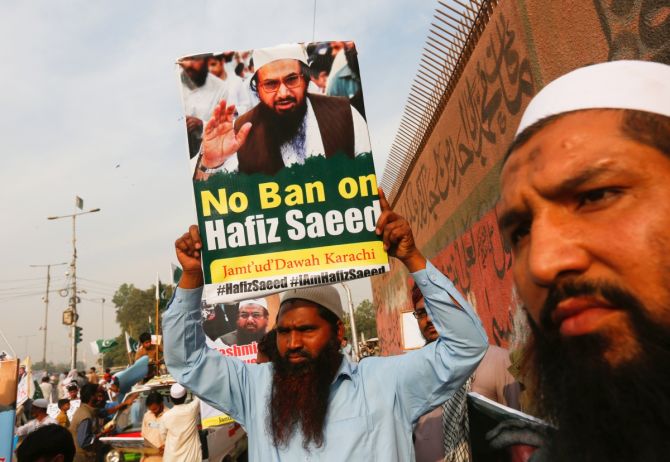
In January 2017, Islamabad got scared enough by a global anti-terrorist consensus to restrain Saeed under Section 11-EEE (1) of the Anti-Terrorism Act, 1977.
He had more money than any other religious leader and had financed the DPC, which hit the road every time the government 'betrayed' the country by relaxing on the 'Kashmir dispute'.
He was put under house arrest. Earlier in April, nothing came of the 'discovery' that he had been running stealth courts across the country in violation of the constitution of Pakistan.
The UN dubbed him a terrorist, putting $10 million as a bounty on his head, but the courts in Pakistan were not tough enough to restrain him or punish him for changing the names of his jihadi outfits.
Saeed, meanwhile, carried on with anti-India hate speech, which actually smeared Pakistan in the eyes of a scared world.
The perpetrators of the 2008 Mumbai attack, who shot dead 166 people, had confessed to details that should have been enough to hang him, but Pakistan enjoyed his anti-India rhetoric and let him spread his tentacles.
****
In January 2016, a terrorist attack took place at the Pathankot Air Force Station, a part of the Western Air Command of the Indian Air Force.
Four attackers and two security forces personnel were killed in the initial battle, with an additional security force member dying from injuries hours later. The Indian reaction to the attack was intense. Babar Sattar wrote in theNews (8 October 2016):
'Pathankot highlighted that the actions of non-State actors can trigger a full-scale war between nuclear-armed India and Pakistan.
'Uri is establishing that it is non-State actors that are now in control of the fate and fortune of the Subcontinent and not the two States. It is time to snap out of our present state of insanity.
'Let us not allow India's fighting words to prevent us from undertaking a Machiavellian appraisal of our national security doctrine and how we have transformed homebred non-State actors into the biggest threat to our security.'
By 2012, Saeed was at par with Mullah Omar and the al-Qaeda chiefs of Iran and Iraq, all of whom carried a reward of $10 million on their heads.
His brother-in-law and co-founder of the LeT, Abdul Rehman Makki, also carried a bounty of $3 million.
Ayman al-Zawahiri, head of al-Qaeda after the killing of Osama bin Laden, remained the most-wanted terrorist in the world, with $25 million on his head.
Saeed was arguably the most powerful man in Pakistan, heading the country'S biggest charity organiSation (JuD).
He was the mover and shaker of the DPC. And he was the spearhead of Pakistan's non-State actors who prevented the country from allowing the resumption of the North Atlantic Treaty Organization supply route through its territory.
****
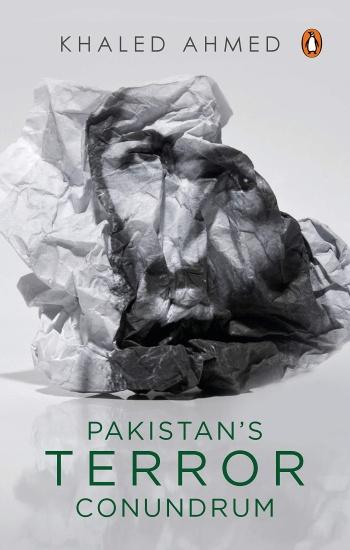
The world didn't buy Pakistan's denial on Pathankot, and since it believed that Saeed had masterminded the Mumbai attack of 2008, led by the US, it wanted Pakistan to prevent Saeed from moving freely in the country, freeze the assets of the groups associated with him and stop allowing the LeT from acquiring weapons -- in accordance with UN Security Council Resolution 1267/1989.
In Pakistan, the JuD was not considered to be a changed LeT and Saeed was a highly respected person because of his jihadi slogans against the 'enemies of Pakistan', which at that point were the US and India.
International reports about the 'connectivities' of the JuD with al-Qaeda, and Saeed's past associations with the founders of al-Qaeda were hardly discussed in the Pakistani media.
Revelations about the various sojourns of Osama bin Laden before his death -- in Kohat, Swat, Karachi and Abbottabad -- and his phone calls to Saeed were dismissed without comment.
As titular head of the DPC, Saeed headed one of the six centres of power in a slowly imploding state. He was the national symbol of Pakistan's defiance of its erstwhile ally, the US.
Pride and honour breed defiance no matter what the odds. Defiance in foreign policy, when no one in the world backs you, is called isolationism. This is another name for defeat in the given international order.
When Pakistan's non-State actors defeated the Soviet Union, the world was on Pakistan's side in the proxy war; in Kashmir, the world was not with Pakistan, and Pakistan was not successful in humbling India.
The blowback from the planned 'victory' against the US was far more lethal than the blowback from the victory against the Soviet Union.
The problem was not only that foreign policy was not being handled by the parliament in Pakistan, but that foreign policy was being spearheaded by elements who had their own agenda.
This edited excerpt from Pakistan's Terror Conundrum by Khaled Ahmed has been used with the kind permission of the publishers, Penguin Random House India.
Feature Presentation: Rajesh Alva/Rediff.com







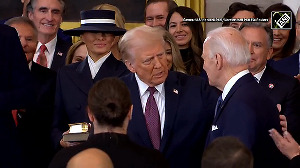
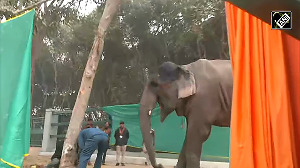

 © 2025
© 2025